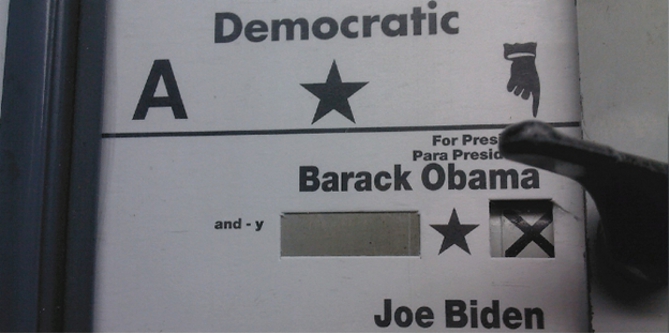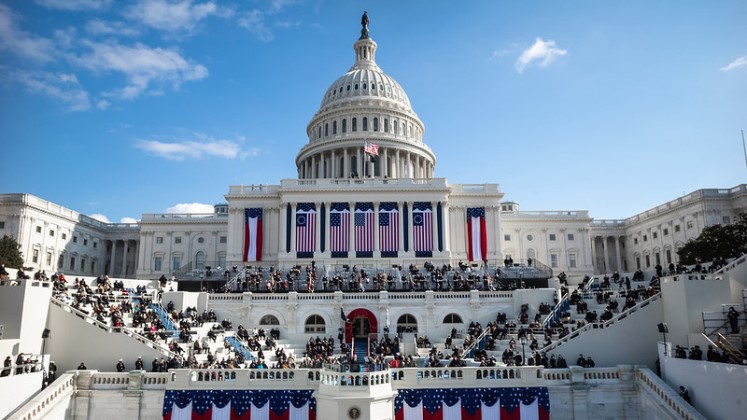
 Lobbying in US politics is not new, but recent revelations over lobbying by Trump election campaign members on behalf of foreign governments and others has brought the practice into renewed focus. Thomas T. Holyoke and Timothy M. LaPira give an overview of a special issue of the journal, Interest Groups & Advocacy, which outlines how lobbying is growing, how its regulation is often not fit for purpose, and how the disclosure of more information may lead to greater accountability among lobbyists.
Lobbying in US politics is not new, but recent revelations over lobbying by Trump election campaign members on behalf of foreign governments and others has brought the practice into renewed focus. Thomas T. Holyoke and Timothy M. LaPira give an overview of a special issue of the journal, Interest Groups & Advocacy, which outlines how lobbying is growing, how its regulation is often not fit for purpose, and how the disclosure of more information may lead to greater accountability among lobbyists.
People don’t like lobbyists. This is hardly surprising since that group is usually depicted as corrupt influence peddlers, pulling the strings of the lawmakers beholden to their campaign contributions. Candidates for office echo the populist outrage against lobbyists, yet cannot seem to separate themselves from them. Take President Donald Trump’s boast that he would “drain the swamp” of Washington, DC, lobbyists, only to find out that one of his closest campaign surrogates and, briefly, National Security Advisor, Michael Flynn, had lobbied for several foreign governments without even registering to do so. Or Corey Lewandowski, an early Trump campaign manager, who spun his connections into a highly lucrative lobbying business almost immediately after Trump took the oath of office. Rather than drain the swamp, more noxious lobbyist-sewage appears to be flowing in. While the facts about lobbying do not quite match the popular portrayal, there remains something unseemly about people whose profession is to influence policy on behalf of well-organized interest groups at the expense of the public. Now with lobbyists for nearly every corner of American industry gearing up to influence tax reform, the problem of lobbyists-gone-wild appears worse than ever. And the problem is hardly unique to the United States.
As political scientists, we recognize the “drain the swamp” rhetoric does not fully recognize positive contributions that organized interests make to the democratic process. Rather, we ought to “cultivate the wetlands” so we can distinguish both the positive and the negative aspects of lobbying. We therefore convened in 2015 a small group of political scientists in Puerto Rico for a panel on the problems of lobbying in democratic governance. Focusing on the inability of regulations governing lobbying to keep up with the creative advocacy used by the influence industry, we assembled their papers on lobbying reform and regulation for a special issue of the international journal Interest Groups & Advocacy (October, 2017). The collection diagnoses the problems of lobbying and prescribes potential solutions, and not just for Washington, DC, but for any democracy, whether in the American states or in Europe. Briefly, what we find is that:
- The sheer number of lobbyists is growing
- Democratic systems vary significantly in who their lobbying laws require to register and what information must be publicly disclosed
- Lobbying laws are often the products of lobbying scandals, but are rarely updated subsequently to account for changes in the way lobbying is done
- Elected officials who benefit from the work of lobbyists are reluctant to enact reforms
- Even the people and corporations who employ lobbyists do not always know what they are doing and have difficulty holding them accountable
- Lobbyist accountability would be significantly strengthened by expanding the definitions of what lobbying actually is
- Accountability would be further aided by public disclosures of the positions lobbyists are actually lobbying for
Diagnosis of the problems of lobbying begins with Herschel Thomas and Timothy LaPira. High demand for lobbying services, they find, is encouraging more and more elected officials and their staff to swiftly pass through the “revolving door,” using their networks of contacts in government and policy expertise to build lucrative lobbying practices. Even more alarming, they find that many lobbyists are taking advantage of the narrow definition of “lobbyist” in out-of-date federal lobbying and transparency laws to avoid registering themselves or disclosing the money they make and spend on lobbying, creating an underworld of “shadow lobbyists.”
Matters are little better in many of the American states, finds Adam Newmark, who tries to get a handle on the problems of regulation and disclosure with his own measure ranking the effectiveness of state lobbying laws. The results? “Kentucky, California, Colorado, Arizona, Maine, Massachusetts, and Wisconsin have the highest regulation scores,” he writes, while “Florida, South Dakota, Nevada, North Dakota, Wyoming have the lowest”.

“Maryland State House – Lobbying” by Daniel Hulzinga is licensed under CC BY 2.0
Similar problems exist in the democracies of Europe. Michele Crepaz investigates the origins of lobbying laws, finding that those in most of the sixteen European and OECD democracies he studies adopted such laws at roughly the same time in the 21st Century. He finds that lobbying scandals have embarrassed governments into enacting lobbying laws, model laws for them to enact offered by the European Union and other international organizations, but many still refuse to do so, even when they have scandals. Jana Vargovčíková finds out why some democracies refuse to enact reforms with an in-depth examination of proposed lobbying laws in Poland and the Czech Republic. She finds that even after embarrassing scandals, reform is still difficult because the very government officials who must enact, and implement them are often the ones who benefited from working with lobbyists in a poorly regulated system in the first place. As an example she notes the Czech government’s consistent refusal to pass any meaningful reforms of lobbying that threatened their power structure.
So what is the prescription for this threat of uncontrolled lobbying? Broader, more comprehensive disclosure. More information available to more people. Lee Drutman and Christine Mahoney argue that lobbyists ought to be required to write position statements as a condition of their engagement in the public policy process. Based loosely on the “consultation process” commonly used in Europe, these statements would describe exactly what it is they are lobbying for in the process, and why. Lawmakers could use them to ensure that the needs of many competing interests are heard, balanced, and addressed. Since these position statements could also be available in an open online database, journalists, academics, the public, and even other lobbyists, could take advantage of this transparency to hold lobbyists accountable.
Furthermore, Tom Holyoke argues that since another problem with modern lobbying is that too often even the people employing lobbyists do not know what their professional advocates are advocating in their name. Nor have they always approved the tactics used. Public disclosure of positions and tactics can help lobbyists be more accountable to the very people they are supposed to represent. Lobbying, he argues, can only be legally protected in the United States if the people represented always know, and explicitly approve, of what their advocates are doing. Any new online database would make it easier for people organized into interest groups to hold their own lobbyists accountable.
These general, evidence-based prescriptions will not solve all of the problems of special interest lobbying of democratic governments. The truth is that lobbying is a natural part of any democracy. We believe, though, that more information is the best regulation, and essential for accountability. Lobbyists may even be more inclined to self-regulate their behavior, knowing their actions can be scrutinized by the public, and the people they represent. It might even encourage them to involve the people they represent in a bit more every-day lobbying, getting them to regularly contact their elected officials rather than always go through a lobbyist. That is the prescription for good health in any democracy.
- This article is based on the October 2017 special issue of Interest Groups & Advocacy, ‘Draining the swamp, or cultivating the wetlands? Toward evidence-based lobbying regulation and reform’.
Please read our comments policy before commenting.
Note: This article gives the views of the author, and not the position of USAPP– American Politics and Policy, nor of the London School of Economics.
Shortened URL for this post: http://bit.ly/2kGXe6h
_________________________________
 Thomas T. Holyoke – California State University, Fresno
Thomas T. Holyoke – California State University, Fresno
Thomas T. Holyoke is professor of political science at California State University, Fresno. He is an expert on interest groups, lobbying, and other forms of political advocacy, as well as education policy and western water policy. He is the author of Competitive Interests: Competition and Compromise in American Interest Group Politics (2011, Georgetown University Press), Interest Groups and Lobbying: Pursuing Political Interests in America (2014, Westview Press), The Ethical Lobbyist: Reforming Washington’s Influence Industry (2016, Georgetown University Press), and three dozen peer-reviewed articles and book chapters.
 Timothy M. LaPira – James Madison University
Timothy M. LaPira – James Madison University
Tim LaPira is associate professor of political science at James Madison University in Harrisonburg, VA. LaPira’s expertise is on Congress, interest groups, and lobbying. With Herschel F. Thomas, he is author of Revolving Door Lobbying: Public Service, Private Influence, and the Unequal Representation of Interests (2017, University Press of Kansas). He has also worked for a member of Congress and as a researcher at OpenSecrets.org, where he was responsible for the Lobbying and Revolving Door databases.







1 Comments